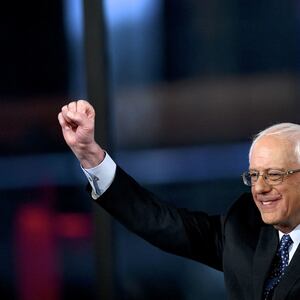In just the last month, Sen. Bernie Sanders (I-VT) unloaded a blistering attack on a leading Democratic think tank. He went after former Vice President Joe Biden on a number of policy fronts. And one of his top congressional surrogates accused Mayor Pete Buttigieg of intellectual dishonesty.
It’s a new, more aggressive look for Team Sanders. The senator who four years ago was known as a gruff but endearing candidate running a democratic-socialist, ideas-driven campaign has decided to bare his fangs more quickly this time, in hopes that it may actually win him the nomination.
“[T]he senator learned… many lessons from 2016,” Nina Turner, a national co-chair of Sanders’ 2020 campaign told The Daily Beast, “and one of those lessons is to show what separates you very clearly from the rest of the people running.”
ADVERTISEMENT
It’s an effort, aides and associates say, born from the new role he occupies in Democratic politics. With his name ID having skyrocketed after his last run—and having assumed the role of the ideological pied piper of the left—Sanders himself said he no longer feels he needs to take the time to introduce himself or his ideas to voters.
“I think we start off with the advantage that many people know where I’m coming from,” the Senator told The Daily Beast in a recent interview, “that all of these issues—health care is a human right, raising the minimum wage to a living wage, addressing climate change, dealing with a broken criminal justice system and a broken immigration system, protecting a woman’s right to choose—these are not new ideas for me.”
Four years ago, Sanders faced a far different landscape. When he entered the presidential contest in 2015, he was seen as an also-ran; the improbability of his bid underscored by the oddity of its launch: a press conference off to the side of the Capitol building.
Though he was an insurgent, Sanders early on often declined to go on the attack, particularly on topics he deemed superficial. During the first debate in October 2015, he was asked about Hillary Clinton’s use of a private email server while serving as Secretary of State.
“Let me say something that may not be great politics,” he said, in what would become one of the early defining moments of the primary. “But I think the secretary is right, and that is that the American people are sick and tired of hearing about your damn emails.”
As the primary wore on, the soft touch disappeared. Sanders took jabs at Clinton for her paid speeches to Wall Street, her praise of Henry Kissinger, and her vote for the Iraq War, among other things. But within the larger Sanders’ orbit, some questioned whether the primary contest—and even the general election—would have played out differently if he had gone after Clinton earlier and more aggressively.
“Inside the campaign, we were all in agreement,” Mark Longabaugh, a top strategist on the 2016 campaign, told The Daily Beast. “[But] there were commentators on the outside of the campaign, other political players who criticized us for not criticizing her on emails. There were people on the outside who were basically saying, ‘You need to engage her on this and take her down on this because if she’s our nominee, the Republicans are going to kill her on this.’ And that was the flak we were getting from the outside.”
Four years later, there is no candidate with email issues for Sanders to address. But there is a much deeper field, with a group of nominees all seeming to gravitate toward similar ideological planks. And, unlike with Clinton, Sanders seems inclined to mix things up even earlier.
Among his campaign hires are a number of veterans of the online left who led the efforts in the early aughts to challenge the Democratic Party from within. They include veterans of the anti-war movement and of now-Connecticut Governor Ned Lamont’s unsuccessful campaign to unseat Joe Lieberman in the 2006 election (Lamont won the primary but Lieberman won the general election as an independent). They also include David Sirota, an unapologetic liberal known for challenging the ideological commitment of fellow Democrats, including fellow presidential candidate Beto O’Rourke, whom Sirota sharply criticized before formally joining the Sanders campaign.
Sirota has kept quiet since then. But the Sanders campaign has not. Last month, it sent a scathing letter to the Center for American Progress accusing the think tank of “using its resources to smear” him and two of his Senate colleagues in the race. Shortly thereafter, Rep. Ro Khanna (D-CA), a congressional ally who serves as a campaign co-chair for Sanders, tweaked Buttigieg on Twitter for a comment he made seeming to draw comparisons between Sanders and Trump supporters. Buttigieg, who famously wrote an essay praising Sanders when he was a high-school student, subsequently said the two politicians have “radically different” philosophies.
But the biggest contrasts Team Sanders has drawn so far have been with Biden. In the past week, the Senator has gone after his fellow septuagenarian for his record on trade and his support for the Iraq War. He said in a recent CNN interview that Biden had failed to stand up to China on trade and had facilitated some of the trade deals that had—in Sanders’ estimation—led to the hollowing of American manufacturing.
This Sunday, in an interview with ABC News, Sanders dismissed the idea that Biden could match his progressive bona fides. “I don’t think there’s much question about who’s more progressive,” he declared.
Sanders and Biden haven’t always been at odds. The two men shared kind words about each other in the past and have found themselves recently agreeing on the need to end U.S. involvement in the civil war in Yemen. And Sanders’ defenders note that his critiques are statements of fact and that he’s not the only one to jab the former VP. Sen. Elizabeth Warren (D-MA), has similarly gone after Biden in the past.
But Sanders’ willingness to go so directly at Biden so early in the campaign also speaks to his team’s desire to send an early message that he is not simply running a feel-good style campaign this time. It’s a message that came from the candidate himself, according to campaign manager Faiz Shakir.
“It is important, especially in a field as large as this field this time around, for the Senator to lay out for the American people why he is uniquely situated and what makes him different than all the candidates running in the race,” Turner said. “He is by far the only presidential candidate where we have consistency. It is important that people not get totally caught up on who like and more caught up on who is going to be the one to unrig the rigged system.”








